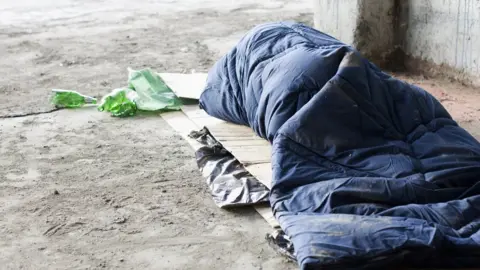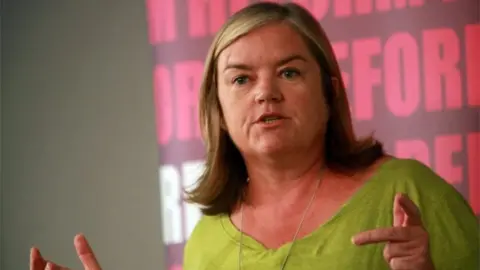Coronavirus: Crisis a chance to 'end rough sleeping'
 Getty Images
Getty ImagesThe coronavirus crisis has given the government an "extraordinary opportunity" to offer rough sleepers long-term help to get off the streets, the head of its homeless Covid taskforce has said.
Dame Louise Casey told the BBC £53m will be spent on support services.
Almost 15,000 rough sleepers have been housed in emergency accommodation since the start of the coronavirus lockdown.
She says a "national effort" is needed to keep people off the streets.
Dame Louise was appointed by Communities Secretary Robert Jenrick last month to lead a specialist Covid-19 rough sleeping group support for rough sleepers during the pandemic.
In addition to the £53m, she says she has secured £160m from the £381m announced in the Budget for permanent homes for the homeless, which she says can be spent now on building and buying accommodation for them, with a plan for 3,300 beds in the next year.
She said the help being given to very vulnerable people may be a "tiny silver lining" to the "horrific period" the country is going through, adding she does not want to see those people go back to the streets.
 Shutterstock
ShutterstockIn an exclusive interview with the BBC's Victoria Derbyshire, she said the government is not promising to find permanent homes for all rough sleepers in England, but that it is trying to "provide the right solutions" for people who have come in off the streets.
She says although the government has made a "good start" on allocating money for 6,000 new homes, it needs to "do more" in partnership with others.
She has called on all sectors of society, including businesses, faith groups and local communities, to join efforts to house rough sleepers and help them turn their lives around.
The Prince's Trust, as well as Prince Charles' charity Business in the Community, are already on board, and a deal is under way for the Youth Hostel Association (YHA) to provide 400 beds for six months.
Meanwhile, charity St Martin-in-the-Fields is putting £1m into a support package for people moving to longer term accommodation.
Comic Relief is prioritising funding for frontline work at Crisis and Homeless Link.
Highlighting the crucial role churches will play, the Archbishop of Canterbury Justin Welby said: "Rough sleeping is a tragedy that ought to belong in the past. Everyone deserves access to safe and stable housing; it is vital for human dignity, equality and justice.
"I am enormously proud of and grateful for the amazing contribution churches across the country make in supporting those who experience rough sleeping and homelessness."
In March, the government instructed councils in England to find emergency accommodation for all those who were sleeping rough on the streets.
It said such accommodation was offered to "90% of known rough sleepers".
Mr Jenrick said the government's work will not end once the pandemic is over, pledging it will do "everything possible" to ensure as few rough sleepers as possible return to the streets "in order to reach our ultimate ambition of ending rough sleeping for good."
On Sunday, he announced funding for 6,000 new long-term housing units along with increased government funding for support services for rough sleepers.
Challenged on whether the 6,000 housing units would be enough, Dame Louise said it was a "fantastic start", adding it was not "the end" but the "beginning" of work to support rough sleepers.
Since the Conservatives came to power in 2010, the numbers of people sleeping rough has more than doubled.
Latest figures suggested about 4,200 people were estimated to be sleeping rough on a "typical" night last year, although BBC research suggested that the true figure was five times higher - finding that nearly 25,000 people slept rough in England at some point in 2019.
